
|
|
Issue Number 15 • Tuesday, April 16, 2024 |
Campus ChampionJasmilka Peña, a senior community health major, is completing a fieldwork internship in New York City but she’ll return to campus on April 20 to receive some nods for her hard work while at SUNY Cortland. She’ll receive the Community Health Award for Outstanding Academic Achievement at a Health Department awards ceremony and later she’ll join SUNY Cortland students in the top 5% of their class for acknowledgements, awards and scholarships distributed at Honors Convocation. Here, Jasmilka will accept a Presidents List Achievement award and the Katherine Allen Whitaker Award, given to a senior health major based upon academic excellence, charm and compassion. Wednesday, April 17Challenge Day: Students, faculty, staff, alumni and friends can give to the Cortland Challenge cause of their choice at RedDragonNetwork.org/challenge. Teacher Recruitment Day via CareerEco: 11 a.m. to 5 p.m. Sandwich Seminar: Research Impact and Metrics, presented by Memorial Library staff, Old Main Colloquium, 12:30 to 1:30 p.m. Opening Reception Student Select 2024: Exhibition that celebrates artwork created by students, exhibition continues through Friday, May 3, Dowd Fine Arts Center, first floor, Room 106, 5 to 7 p.m. First-Year Teacher Panel: Presented by the Education Club, Sperry Center, Room 205, 7:30 p.m. Thursday, April 18Coffee & Coursework: Drop-in tutoring event sponsored by The Learning Center, Corey Union Exhibition Lounge, 11 a.m. to 3 p.m. Sandwich Seminar: I Learned by Doing, presented by interns from Institute for Civic Engagement, Old Main Colloquium, noon to 1 p.m. EAP presents Cortland County Office for Aging: A representative will talk about the services and programs they offer including benefits for those nearing retirement age as well as information about elder care for caregivers, Corey Union Fireplace Lounge, noon to 1 p.m. Career Services presents Strategic Salary Negotiation: Online via Handshake, 4 to 5 p.m. Friday, April 19Cortland Nites: Paint & Sip, Corey Union Function Room, 8 p.m. Saturday, April 20Spring Fling Glow Foam Party: Hayes/Hendrick Quad (Corey Union Function Room Rain Location), 7 to 9 p.m. Sunday, April 21THE BIG EVENT!: Student Government Association's day of community service for Cortland students to give back to the local community. Meet at Park Center Alumni Arena, 9 to 9:30 a.m. Check-in and light breakfast; 9:30 a.m. depart to jobsites. Monday, April 22Career Services presents Money Talks Mondays – All About Credit: Online via Handshake, 4 to 5 p.m. Spring Fling Karaoke: Corey Union first floor lounge, 6 to 9 p.m. Tuesday, April 23Spring Fling Comedy Night: Corey Union Exhibition Lounge, 8 to 9 p.m. Wednesday, April 24Sandwich Seminar: COIL First-hand Experiences, presented by a faculty panel, Old Main Colloquium, 12:30 to 1:30 p.m. Distinguished Voices in Literature: Author Hai-Dang Phan, Old Main Colloquium, Room 20, 5 to 6 p.m. Powerlifting Meet: Open to students and staff, hosted by the Recreational Sports Department, Student Life Center, 6 p.m. Spring Fling DIY Night: Corey Union Function Room, 6 to 8 p.m. Take Back the Night March: Students Active for Ending Rape (SAFER) host a Take Back the Night event to raise awareness about sexual assault, community march and speeches, Corey Union steps, 7 p.m. Thursday, April 25Sandwich Seminar: Toyhacking and Digital Storytelling, Old Main Colloquium, noon to 1 p.m. Transformations Keynote Address: Delivered by Kevin Dames, recipient of the 2024 Dr. Peter DiNardo ’68 and Judith Waring Outstanding Achievement in Research Award, Sperry Center, Room 104, 4 p.m. Career Services presents Understanding Benefits: Online via Handshake, 5 to 6 p.m. Spring Fling Bingo: Sperry Center, Room 105, 7 to 9 p.m. Friday, April 26Make a Difference on Arbor Day: A campus beautification event, meet at Moffett Center for work assignments, 8:30 to 10:30 a.m., annual Arbor Day Tree Planting, near Casey Tower parking lot, 11 a.m. Transformations: Student presentations, Bowers Hall, 10:20 a.m. to 4 p.m. Transformations Writing Gala: Dowd Gallery, 5 p.m. Saturday, April 27Spring Fling Carnival: Moffett Center lawn (Corey Union Rain Location), 11 a.m. to 3 p.m. Spring Fling Concert: Park Center Alumni Arena, 7 p.m., doors open at 6 p.m. Monday, April 29Life After Cortland - Get Career Ready: Online via Handshake, 4 to 5 p.m. Disability Resources Office Focus Group: Please register using the QR code, Corey Union Caleion Room, first floor, 5:30 to 7 p.m. Tuesday, April 30Sexual Assault Awareness Month Event: Planting Healthy Relationships, learn how to take care of healthy relationships as well as a succulent. Plants will be available to the first 100 participants, Corey Union steps, rain location in Corey Union lobby, 1 to 3 p.m. Pizza and Papers: Get writing and research done with Memorial Library and the Writing Center, registration required |
Cortland Challenge 2024 is April 1704/16/2024Mark your calendars. SUNY Cortland’s annual, 24-hour fundraising event is being held on Wednesday, April 17, and there’s more at stake than ever. This year, donors can help unlock potentially more than $130,000 in matching gifts — $30,000 more than last year — thanks to pledges made by numerous generous alumni, faculty and staff, and friends! On Challenge Day, students, faculty, staff, alumni and friends can give to the Cortland Challenge cause of their choice at RedDragonNetwork.org/challenge. These causes include The Cortland Fund, athletic teams, campus programming and more. The challenge competition for academic departments is back for a third year, only with an added incentive provided by personal contributions from members of the President’s Cabinet. 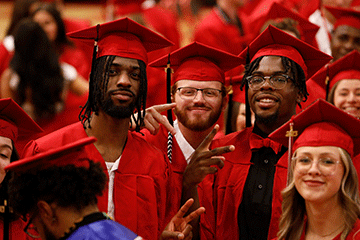 “This has been a thrilling year for Red Dragons everywhere to show their pride in SUNY Cortland,” SUNY Cortland President Erik J. Bitterbaum said. “The Cortland Challenge offers yet another opportunity for our community to come together and support a common goal: to open doors for our current and future students. No gift is too small to help in this effort. Many generous supporters have pledged matching gifts to support the Cortland Challenge, including Norma Schlager ’62, Victor Rumore ’84, Anthony Moon ’86 and Susan Moon, Joel Tiss ’85, Gerald Brown, Michael C. Holland Emergency Fund for Students Committee, Girish Bhat and Sharon Steadman and Cheryl Barredo M ’81. You can learn more about our generous Cortland Challenge donors online. Thanks to them, a total of $55,000 in matching gifts for SUNY Cortland will be unlocked throughout the day as certain donor milestones are met:
The Athletics Challenge will return, backed by a generous, $10,000 matching gift offered by Charles Bocklet ’58. The 20 teams will be broken into four categories: small, medium, large and extra-large based on the number of alumni and previous donor participation. Each team will compete to earn more than $2,000 in awards by unlocking various fundraising achievements, including most donors, most dollars and highest average Cortland Fund gift. Thomas Christiano ’85 and David Colagiovanni ’11 have each offered a special giving incentive to the teams they played for during their time in Cortland, men’s ice hockey and wrestling, respectively. The Department Challenge this year will add a new, friendly competitive aspect among more than 40 departments seeking to raise money for their specific needs. Academic and campus areas will compete for the most donors and the $2,000 first prize, and second- and third- place prizes of $1,000 and $500 respectively. Each participating group can also win a $100 award if 20 unique donors contribute to their initiative during the Cortland Challenge. The $12,000 in available matching gifts were generously contributed by members of the President’s Cabinet: Erik Bitterbaum, Richard Coyne ’07, Lorraine Lopez-Janove, Ann McClellan, C. Gregory Sharer, April Thompson and Mark Yacavone ’94. As in past years, many departments are working with sponsors of gifts, ranging this year from $500 to $10,000, in money generously offered to match whatever other donors can contribute on Cortland Challenge Day. These additional pledges have been offered by Cary Carbonaro ’90, Ernie Logan ’73, Robert Bookman ’76 Esq., Virginia Carter ’74, Michael Bond ’75, M.D., William Baerthlein ’76, M.D., Louise M. Conley, Sheri Baron ’77, Barb Galpin ’68, Marcia Anderson ’73, Frank Rossi, David Kronman ’80 and Sandra Kronman, an anonymous ’03 grad and two anonymous ’88 grads. SUNY Cortland will also match up to $5,500 in dollar-for-dollar contributions to The Cortland Fund, a discretionary fund dedicated to the university’s greatest and most immediate areas of need that have an impact on the entire campus community. This challenge was bestowed on the university by friend of the university Gerald Brown. 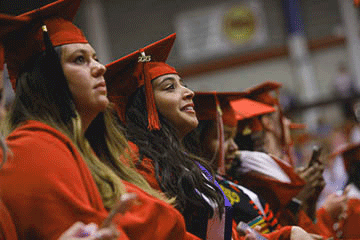 This year, the Michael C. Holland Emergency Fund for Students Committee has pledged matching gift funding of roughly $6,330 to benefit the Cortland College Foundation’s Student Emergency Fund administered by Student Affairs. The committee’s one-time gift redirects a private fund created in memory of Michael C. Holland, a popular Student Affairs administrator who died in 2011, and run by a combination of university and Interfaith Association staff members. Leading up to the big day, the entire campus community is encouraged to:
To make a gift, learn more or track the Cortland Challenge’s progress, visit RedDragonNetwork.org/challenge. And don’t forget, on Challenge Day, use the hashtag #CortlandChallenge to follow along with other Red Dragons through Facebook, Instagramand X (formerly Twitter). Make a Difference Day returns for campus spring cleaning04/15/2024The sun is out, birds are singing and plants and animals are becoming active again after laying dormant for months. Among the things coming back to life this spring is SUNY Cortland’s Make a Difference Day campus cleanup. The long-dormant event, full of hard work and good vibes, is being revived after more than a decade away. Happening on Arbor Day, it’s all about students, staff and faculty coming together to make the school grounds beautiful. Make a Difference Day takes place from 8:30 to 10:30 a.m. Friday, April 26, followed by the university’s annual Arbor Day tree planting at 11 a.m. Student, staff and faculty volunteers who sign up should arrive at Moffett Center by 8:30 a.m. Tools and gloves will be provided, as will transportation to and from worksites. Coffee, donuts and T-shirts will be provided to volunteers who register with Facilities Operations and Services’ Jamie Rounds through email by Monday, April 22. “I’m thrilled that this Arbor Day celebration is returning to campus,” SUNY Cortland President Erik J. Bitterbaum said. “The event provides a wonderful opportunity to spruce up campus as the semester winds down, but more importantly it reaffirms our campus commitment to sustainability and the well-being of our natural environment. Everyone has the ability to make a difference on Arbor Day, and this event is proof.” The Arbor Day cleanup is scheduled five days after The Big Event, SUNY Cortland’s student-run community cleanup. The two events are separate, with similar, but different goals. The Big Event, set for April 21, is a community-wide volunteer effort in which hundreds of students spread out to worksites throughout Cortland. Make a Difference Day, on April 26, is a volunteer spring cleaning for the SUNY Cortland campus. Dan Dryja, director of Facilities Operations and Services, estimated that it has been more than a decade since members of the SUNY Cortland Community participated in Make a Difference Day. The idea began last year while he and others were thinking of ways to make Arbor Day a bigger event for the university. “Then it hit me, ‘Hey, Make a Difference Day? It’s getting close to Commencement, and this is a great opportunity and used to be really well attended.’” Planned project spots include the Lynne Parks ’68 SUNY Cortland Alumni House, SUNY Cortland Stadium Complex, planters located around campus and the Student Life Center. The number of work sites will depend on the number of volunteers who sign up. Individuals signing up will need to list:
Departments, athletic teams and clubs will need:
Dryja noted that it was always a diverse group of staff, faculty and students who joined together to help. “We had certain people that would come out and always want to work around places like Park Center, edging trees or pruning or planting annuals, because it was their building and they took pride in it and wanted to help out,” he said. “Or they would have particular grounds workers that they enjoyed working with, so they would always want to get paired up with them. It was just a good time.” This year’s Arbor Day tree planting will have Bitterbaum and members of the Tree Advisory Committee establish a bald cypress near the Casey Tower parking lot, along with two white oaks. Dryja noted dead trees had previously been removed in that area. The bald cypress is a specimen tree, meaning it will become a scenic focal point as it grows along with the university. “(The area) is a big open lawn now that’s very visible,” Dryja said. “We thought a nice specimen tree in that area would be wonderful.” Capture the MomentSUNY Cortland students add a little color to their lives as they celebrate Holi, a Hindu holiday, during a festival on April 10 organized by Recreation, Parks and Leisure Studies students. Celebrants traditionally throw colored water and powders on one another in joyous celebration of spring and the triumph of good over evil. In Other NewsSUNY Cortland wins $2 million in teacher preparation grantsSUNY Cortland will receive almost $2 million in state funding to help ease the nation’s teacher shortage by creating alternative paths for adults already working in schools to become certified teachers. “The point of these grants is to work with district partners in our region to create alternative pathways to teaching that can help teaching assistants and paraprofessionals to continue in their jobs while working on their teaching credentials,” said Andrea Lachance, dean of SUNY Cortland’s School of Education. “These types of certification pathways are for career changers. The hope is that these alternative pathways will allow more people to enter the teaching profession and help address regional teaching shortages.” SUNY Cortland is one of only two SUNY institutions to win part of a $13.6 million package of Workforce Development awards announced Friday by Governor Kathy Hochul and the New York State Office of Strategic Workforce Development. Cortland was also the only higher education institution to win awards in both of the programs funded. A total of 12 New York state colleges and universities received grants. SUNY Cortland was allocated roughly $1 million each through the two programs — the Alternative Teacher Certification Program and the Upskilling Paraprofessionals Program — to provide opportunities for adults who aren’t in college but are interested in becoming certified educators. “The Alternative Teacher Certification Program is a pathway to the teaching profession that may help reduce time and cost barriers for candidates interested in a teaching career,” said New York Governor Kathy Hochul. “This program provides funding to expand existing alternative teacher certification programs or develop and implement new high-quality, research-based, graduate-level alternative teacher certification programs.” The Upskilling Paraprofessionals Program targets individuals who are already working in schools as teaching assistants and are an essential part of the teacher pipeline given their prior classroom experience and strong connections to the communities they serve. SUNY Cortland’s School of Education runs the largest public teacher education program in New York state, and one of the largest in the nation. As such, it will play a key role in producing new educators to address the shortage plaguing school districts throughout the country. During the five-year project, most of the funds spent at SUNY Cortland will take the form of direct support for student tuition and fees for approximately 30 students per year. 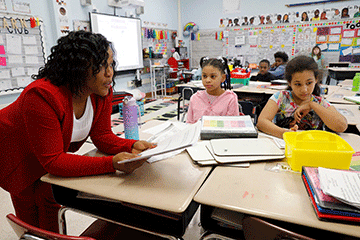
One of these grants will support tuition and fees for teaching assistants and substitute teachers in local schools who already have a bachelor’s degree and who are looking to earn teacher certification through alternative pathways. The university’s second grant will support tuition and fees for teaching assistants in local schools who don’t have a bachelor’s degree and are looking to earn both their degrees and their teaching credentials at the same time. To identify prospective participants for the program, the university will work closely with three regional Boards of Cooperative Educational Services (BOCES): Onondaga-Cortland-Madison, CiTi (Oswego), and Tompkins-Seneca-Tioga. Lachance noted that OCM BOCES alone has around 400 teaching assistants. Participants in either grant program will take all their coursework either at SUNY Cortland or at grant partner Tompkins Cortland Community College (TC3). The initiatives represent a sea change from the tradition of recruiting new first-year students to complete a two-year community college degree or four-year baccalaureate degree in education. 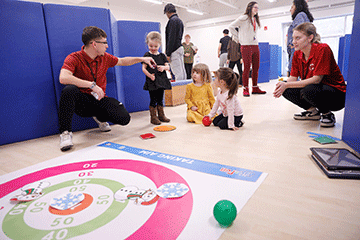
Candidates will likely be people who already are working in some capacity with children from pre-kindergarten through high school, according to Lachance, and their post-secondary levels of education are likely to differ widely. “It’s really focused on taking people who are already working in school systems and don’t have certification and helping them to get what they need to get those teaching credentials,” she said. The university will work hard to ensure the teacher candidates can earn their required classroom observation hours and student teaching semester in their current workplace. “We’ll have to create some alternative coursework or avenues for them to complete field hours on the job,” Lachance said. “That’s the other barrier to people wanting to teach when they are already on the job. They’ll be allowed to get their field hours and, if needed, their student teaching while they are working.” “These programs dovetail nicely with our new program development supported by SUNY Transformation Funds, including the online Bachelors in Integrated Studies and the online Master of Science in Teaching in Adolescence Education,” said Lachance. Grant funding is set to begin on July 1, 2024, according to Lachance, and the first year will be a planning year. Participants in the program will likely begin their studies in the 2025-26 academic year. On campus, Lachance worked closely with her colleagues Dom Fantacone, director of research and sponsored programs, who supported the proposal writing and project budget creation, and Joseph Menard, visiting assistant professor in foundations and social advocacy, who works closely with school districts in our region. Additional support in preparing these grant proposals came from Colleen Viggiano, deputy superintendent, OCM BOCES; Matthew Cook, district superintendent, OCM BOCES; Christopher Dodd, district superintendent, CiTi (Oswego) BOCES; Jeffrey Matteson, former district superintendent, TST BOCES and current senior deputy commissioner for education policy at NYSED; and Victoria Zeppelin, director of CollegeNow, Tompkins Cortland Community College. “As New York state’s largest teacher education provider, SUNY is dedicated to preparing the next generation of educators who will inspire students to pursue their dreams,” said SUNY Chancellor John B. King Jr. “We need more New Yorkers to join the ranks of our teaching profession and thanks to Governor Kathy Hochul, these workforce development grants will have a significant impact on expanding our programs to prepare more excellent diverse future educators.” SUNY Cortland senior earns EOP’s highest honorSUNY Cortland senior Katelyn Thompson makes college look easy. The Alpha Sigma Alpha sorority member served on the Student Activities Board planning fairs and other extracurricular activities for classmates. She interned with the SUNY Cortland Alumni Association. She sang with the Cortland vocal ensemble A Cappella. She’s coached high school students to advance their careers. But for Thompson — who has lined up an almost fully paid graduate school placement toward a career in speech pathology — appearances can be deceiving. She said her pursuit of higher education has been quite challenging. “The Educational Opportunity Program at Cortland (EOP) is the reason I’ve been able to be so successful in college,” said Thompson, a dual degree candidate in speech and hearing science and communication studies from East Elmhurst, N.Y. After just four years, she’s on track to earn both a B.S. and B.A. in May. 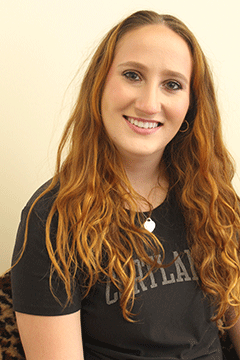 Recently Thompson was named one of only 52 honorees from campuses across the 64-campus SUNY system to earn a 2024 Norman R. McConney Jr. Award for EOP Student Excellence. The McConney Award honors the late co-architect of the EOP, a graduate of the University at Albany and former assistant dean for special programs at SUNY. McConney was a champion for addressing inequities faced by underrepresented populations. Thompson, the fifth SUNY Cortland student to be honored in the award’s five years of existence, will be formally recognized at an April 18 ceremony in Troy, N.Y. “Katelyn is well deserving as she is our highest performing student and most involved on the campus and in the community,” said Cortland EOP Director Lewis Rosengarten. “She expects a lot from herself and pushes herself very hard,” said Cortland EOP Senior Academic Counselor Judy Stoddard M ’10. “This is shown by her double major and how well she does in both. Katelyn puts her all in whatever she does, but most of all she is a kind and thoughtful person. We are so proud of her.” Tanya Maggs, SUNY Cortland’s associate director of event management, supervised Thompson as a student intern in Fall 2022. “She was a wonderful intern,” said Maggs of Thompson, who helped run numerous alumni events at the Lynne Parks ’68 SUNY Cortland Alumni House, including Hall of Fame Weekend, baseball reunion and Harvest of Gold. “She did very well in engaging with our alums. She’s a very hard-working individual, eager to learn. I knew then she was going to do a lot of great things.” Thompson loved growing up in the Queens, Jackson Heights and Flushing area of metropolitan New York. “Queens is the world’s borough, it’s super diverse,” she said. “My friends were from all around the world, and it was a unique experience growing up around them.” Thompson always knew she must pay for college herself. Her father works at two jobs to support the family while her mother is a fulltime caregiver to Thompson’s two older sisters with special needs. “I could have gone to a CUNY school and that’s where most people where I’m from go,” said Thompson, who attended John Bowne High School in Flushing, N.Y., with roughly 4,000 students. “But I wouldn’t have done as well,” she said “Bowne did not offer much academic support meant to prepare you for college. “In order for me to do well in college I needed to get out of my house,” Thompson said. “I had no space to study. When I’m at home I sleep on a couch in my living room. Here at Cortland, people complain about living in the residence halls, but I say, ‘I finally have half a room for me, myself and I.’ In her sophomore and junior years, Thompson served SAB as events coordinator and president, respectively. “It was nice and fun getting that creative experience, because you have such a large budget of money, you have a team,” Thompson said of organizing major events like Cortaca Week and Spring Fling. “You just have fun with it and can be creative.” Besides its tuition stipend, EOP also helped Thompson, always a strong writer, improve her academic profile with extra hours of tutoring in sciences and a speech class. “That’s one of the reasons I’m going to graduate in May,” said Thompson. “Without having to worry about money, I’ve been able to focus on all the extracurriculars in college,” she said. “My extracurriculars are probably what got me all my graduate school offers (roughly one dozen) because they are what set me apart.” A member of Chi Alpha Epsilon, the national honor society for the Educational Opportunity Program, she also earned the Highest EOP cumulative and semester GPA and made the President’s List. She mentors new EOP students for EOP COR 101, a required transitional course for first-year EOP students. To support her education, Thompson has done work-study jobs on the Corey Union information desk and with the Advisement and Transition Office. She is a campus tour guide and, for the last two years during school breaks, has served her former high school as a Bridge to College Coach through the College Bound Initiative. The EOP serves more than 10,000 SUNY students a year. It supports a diverse student body, and many participants are the first in their family to go to college. In its 56-year history, the EOP has served more than 85,000 students and evolved into one of the country's most successful college access programs. Fish conservation research presented by studentsThree SUNY Cortland students had the chance to show what they’d learned during a summer-long internship that took them from campus to the Great Lakes. The internships, to help save a key piece of the Great Lakes ecosystem, are a collaboration between the university, SUNY Oswego, the federal Tunison Laboratory of Aquatic Science in Cortland, the Lake Ontario Biological Station in Oswego and other agencies and organizations. It's all part of the United States Geological Survey’s (USGS) Coregonine Restoration Framework — a plan endorsed in 2018 by fishery managers representing eight U.S. states, three U.S. intertribal organizations and the Canadian province of Ontario. It seeks to restore and conserve the coregonine subfamily of freshwater fish, including whitefish like trout, found in the Great Lakes. Coregonine fish species were once harvested at commercial fisheries and still serve as part of the food chain for other commercial fish, making them vital for both a healthy ecosystem and economy. Great Lakes fisheries are worth $7 billion and support over 75,000 jobs annually, according to project leader and SUNY Oswego biological sciences faculty member Nicholas Sard. Cortland students Kayelah Brown, Morgan Bulger and Preston Fuerbacher joined with two SUNY Oswego students to reveal their research results at the New York Chapter of American Fisheries Society’s annual meeting from Feb. 6 to 8 in Cooperstown, N.Y. Each intern picked a project to work on during the summer. Research was done through the Tunison Lab of Aquatic Sciences and Oswego’s Lab of Biological Sciences. “Presentation of their research at a scientific meeting is the culmination of the students’ hard work over the summer and into the fall semester,” said Mary Beth Voltura, associate professor of biological sciences. “The meeting provides a wonderful opportunity to network with experts in the field of fisheries biology.” The chance to present their findings and connect with professionals was a valuable tool for their future, according to junior Preston Fuerbacher, a conservation biology major from Fairport, N.Y. “The presentation aspect was the best experience,” she said. “I stood in front of my poster and talked to anyone who was interested in my project.” 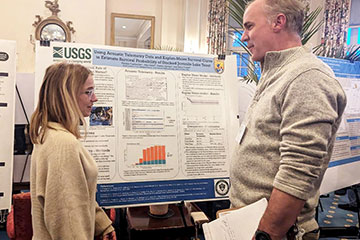 Fuerbacher met people in the New York State Department of Environmental Conservation (DEC) and in Ph.D. programs, and fishery managers. “All were helpful in giving advice and outlooks into this career” Fuerbacher focused on running previously collected data through a computer program to predict survival rates of stocked lake trout. She said she enjoyed learning how a research project works, and that it expanded on what she learned during labs in her regular classes. “It was great, as I got to learn all about the different aspects of acoustic telemetry. I helped surgically tag fish, I went out on the lake and changed batteries in the transmitters, and I got to learn the analysis side of it.” The focus of sophomore biology major Morgan Bulger of Burt, N.Y., was walleye spawning in the Black River. “The fieldwork happened at night, so we left the lab around 4 (p.m.) to head out to the Black River,” she said. “We did a lot of sampling and towed up the Three River sections. We didn’t arrive back at the lab until 1 in the morning. This is only my second time going out in the field during the summer. I learned so much about what conducting research in the field was like.” Bulger said that her presentation went well and that she had a great time connecting with other students and knowledgeable professionals. She always knew she wanted to have a fish-related career after graduation, but now has a clearer idea of what that will be. “I particularly loved the restoration that many of these places do, not only in the lab but also in the field. I want to improve the world, and this experience has shaped that for me,” Bulger said. SUNY Cortland’s Li Jin, professor in the Geology Department and coordinator of its Environmental Science Program, noted that these types of internships are a big advantage for students, and that similar positions are available to applicants. “Conducting research and presenting research findings at professional conferences as an undergraduate student is not common,” Jin said. “At Cortland, we strongly encourage these types of experiences as they significantly contribute to students’ academic growth by transforming their educational experience.” She added that she hoped experiences like this would help shape the students into advocates for environmental conservation and future leaders in the field. “We’re grateful for the opportunities provided by this USGS-funded project for our Cortland students,” Jin said. “It has offered them exceptional opportunities to learn from outstanding research scientists and experts through conducting field and laboratory work, and to make meaningful contribution to ongoing fish conservation and restoration efforts in the Great Lakes.” Voltura and Jin have just finished reviewing the latest round of applications and are in the process of awarding new internships. They said they are excited to welcome a second cohort of students to join them this summer and look forward to working with faculty and researchers from SUNY Oswego and USGS. Special Olympics club aims highOn Wednesday nights at SUNY Cortland, you can find a group of athletes developing their physical prowess. You might catch one celebrating a victory, one arm pumping a fist while the other holds a metal baton in the other. You might notice coaches laying down cones, grinning with anticipation as they mark off a landing area for their athletes. You may even see a head down with disappointment after an underwhelming rep, all to be consoled and encouraged for the next one. No, this isn’t a Cortland varsity track and field practice. The energy and dedication displayed, however, are more than comparable. 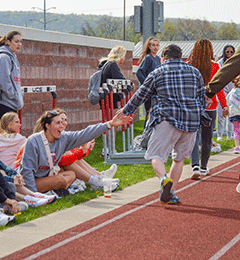 The athletes and coaches are part of Cortland Stars, SUNY Cortland’s Special Olympics club, which is gearing up for its annual track meet, the Cortland Classic, on Saturday, April 20. Details are forthcoming. The club allows student coaches to work with individuals with varying levels of intellectual disabilities, autism or Down syndrome. They invite athletes from all ages and backgrounds, with most hailing from Cortland and Ithaca, N.Y. “Our active mission is to provide an opportunity for individuals with and without disabilities to come together to achieve a common goal through various sports like basketball, soccer and track,” said Cortland Stars co-president Morgan Valerino of Syracuse, N.Y. Practices are every Wednesday at 7:30 p.m. in the university’s Student Life Center basketball courts. All students are welcome. The Cortland Classic has been a marquee event, culminating the Stars’ work throughout the year. Athletes within the program compete with the Special Olympics clubs of Ithaca and other regional clubs. 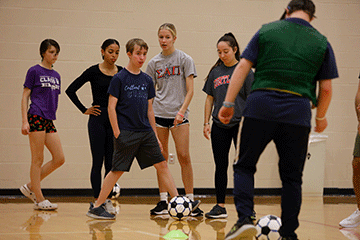 Cortland Stars athletes participate in the long jump, 50-meter dash, 400-meter dash, and shot put. All events are officially timed and recorded and the athletes are cheered on by SUNY Cortland fans and members of various athletic teams. Since its inception in 2018, the club has taken many forms and remained strong despite the COVID-19 pandemic. The club shifted to online programming, which involved having a different Cortland coach take over and lead programming such as stretches or yoga over Zoom. “COVID created a different atmosphere,” said Valerino, a senior in Cortland’s inclusive childhood education major. “Our program thrives off of socialization, and building those general relationships is hard to do online.” Even in the initial return to in-person meetings, the club faced challenges. “Because of the different restrictions on masks and no high fives, we had to do elbow bumps instead,” Valerino said. “So, it was hard growing during COVID-19, but now, seeing each other smile has been such a huge part of it.” The program has stayed strong two years after the COVID restrictions were removed. About 20 student coaches participate with the seven athletes weekly, and the athletes’ progress is clear. “They’ve grown exponentially from when we started,” said co-president Morgan Rehm of Merrick, N.Y., about the progress made by the athletes during the three years she’s worked with them. “They’ve grown not just their abilities to do sports, but socially.” 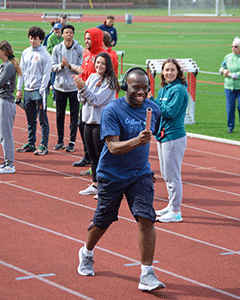 Rehm, also a senior, is a science major with a minor in the psychology of individuals with disabilities. She wants to be a pediatric occupational therapist and, like Valerino, had worked with clubs like Cortland Stars throughout high school. However, this type of background isn’t required to participate. “I think a lot of people think that they need to have experience working with people with disabilities, too, which you don’t,” Valerino said. “I mean, Morgan and I did, but Ronnie didn’t have any, and now he’s vice president of the club, Rehm said, referring to Ronald Marchese-Solano, a sport management major from Long Island who eventually wants to work in event management for a sports team or a sports business. Marchese-Solano saw the mission of the Cortland Stars at a club fair, which was enough for him to start his journey with them. He said the club allowed him to grow with the athletes. “One of the things that we really emphasize is making connections with athletes,” he said. “It really means something to the athletes when they see you come every week, show up and have a good time. As much as they learn, we learn as well.” This symbiotic relationship Cortland Stars coaches have with the athletes manifests itself with the impact of the work they do every week. “We had an individual come up to us last semester saying how much this has changed their life,” Valerino said. “With everything going on in the world, having some part of your week that is rewarding, encouraging and ignites your passion, whether that be through sports or just socializing with people in general, has been the most rewarding part of it all.” Contact co-presidents Morgan Valerino and Morgan Rehm for more information. Prepared by communications office writing intern Jean-Andre Sassine Jr. '23 The Big Event Returns April 21The Big Event, a student-run, communitywide civic-engagement project that caught the attention of New York’s Lieutenant Governor Antonio Delgado during a recent campus visit, will take place on Sunday, April 21. With a total of 460 volunteers signed up to participate, registration allowing organizers to match groups with the 47 identified job sites is now closed. However, volunteers will continue to be accepted up to morning registration at the event. Those signed up have significantly exceeded last year's 405 volunteers at 40 sites. The university’s Student Government Association (SGA) is once again organizing the event, which became a Cortland tradition in 2015 by sending hundreds of SUNY Cortland students to out into the Cortland community, cleaning, raking, painting and otherwise sprucing up a mix of private residences and businesses in their town. SGA officers will give a presentation about The Big Event at Cortland’s spring administrative meeting on Monday, April 22. The Big Event is the SGA’s largest, with Fall Festival coming second, said SGA Event Coordinator Emily Gallagher, a senior political science major from Cortland. “It’s just a great way for us to match students with community projects and kind of get them out there so SUNY Cortland is involved with the community,” said Gallagher, who is co-organizing the event with SGA President Joe Mascetta. “We’re not two separate things. There isn’t just SUNY Cortland. Or the City of Cortland. Or Cortland county. It’s all one thing.” Gallagher and Mascetta got an opportunity to describe The Big Event to Delgado during his Feb. 28 visit to campus to hear from students about the university’s wide-ranging community service efforts and learn how the state can help students in their efforts. That student input will help inform the early development of New York’s Office of Service and Civic Engagement, a new state office created by Governor Kathy Hochul in January that Delgado is tasked with developing. 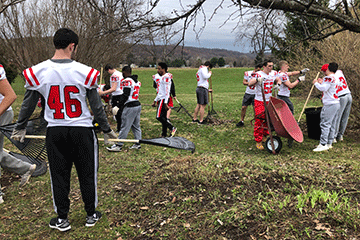 “I got to explain to him the community service aspect that Cortland has, and it’s through this event,” Gallagher said. “I briefed him on what we did, which is we send students out into the community to give back on one big day of community service. “He said he thought that if every SUNY campus had something like this going on, it would be something like what that office he’s creating would be looking for,” Gallagher said of Delgado, who described Cortland’s program as a potential model for the rest of the state. “He was impressed that we have something like that in place.” Planning is well underway, Gallagher noted. Updates will be available on the Cortland SGA’s Instagram page. On the big day, volunteers should check in at Park Center Alumni Arena between 9 and 9:30 a.m., where they are welcome to share a light continental breakfast. Participants will then organize into groups and depart for work sites by their own transportation at 9:30 a.m., continuing to depart through the morning. The Big Event will run through 3 p.m. Volunteer work may include raking leaves, cleaning up trash, painting front porch steps, or any other requests SGA receives from community members. 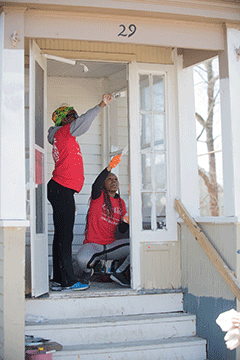 Volunteers are encouraged to bring their own equipment, but the SGA will supply tools for those who don’t bring them. The SGA also is asking worksite hosts to supply the necessary tools for their site, if possible. Participation by members of Greek organizations, student clubs and athletic teams has fostered a strong turnout in the past, Gallagher noted. This year will feature a strong showing by Greek organizations including Alpha Sigma Alpha and Sigma Delta Tau along with student athletes from football, women's lacrosse, women's soccer and club baseball. Founded at SUNY Cortland in 2015 by Ashlee Prewitt ’14, the student club Actively Involved in the Community (AIC) was previously responsible for organizing this event each spring. More than 400 volunteers participated in the first The Big Event in Cortland. For Gallagher, who is interning with the New York State Department of Environmental Conservation’s Cortland office, The Big Event is the first time she has given back to her own community. “High School would have been my chance, but it was the COVID high school years, my junior and senior years,” in the Homer schools, said Gallagher, on track to graduate from Cortland in just three years. “So, I didn’t have much of a chance. It’s a pretty big chance, too, now so I’m enjoying it.” Student research showcased at TransformationsThe best of SUNY Cortland’s student academic projects will be highlighted when the annual Transformations: A Student Research and Creativity Conference returns this month. A total of 120 students will showcase their work, including 58 presenting talks, 53 presenting posters, and nine reading their works at the Writing Gala, which is returning after a successful debut last year. Created in 1997 as Scholars’ Day, the conference lets students share the results of their hard work throughout the school year on an array of topics. It was renamed Transformations in 2012 to emphasize how research transforms the studied subjects, the students’ lives and the world at large. “For some students, Transformations will be their first opportunity to present the results of their work at a professional conference,” said Bruce Mattingly, dean of arts and sciences and chair of Transformations. “For the campus, this is an opportunity to appreciate the breadth of research and creative activity happening in every academic department at SUNY Cortland.” 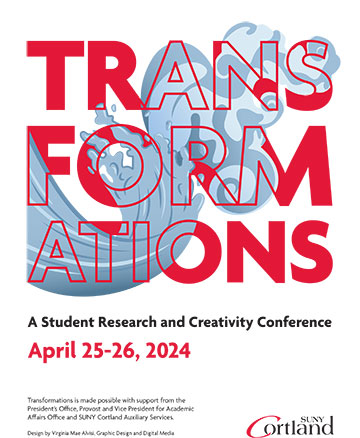 Transformations begins with the annual keynote address at 4:30 p.m. on Thursday, April 25, in Sperry Center, Room 104. The speaker will be Kevin Dames, SUNY Cortland associate professor of kinesiology and recipient of the 2024 Dr. Peter DiNardo ’68 and Judith Waring Outstanding Achievement in Research Award. It continues the next day, Friday, April 26:
More information is available on the Transformations website. Planned presentation topics include the use of exercise to reduce Parkinson’s disease symptoms, the negative impacts of social media, the vulnerability of the elderly to financial scams, and the effect of book banning efforts on public education.
Each year the university sends out a campuswide call for presentations and uses faculty members serving as mentors to encourage students to participate. All students given a summer fellowship from the Undergraduate Research Council are expected to contribute. “I hope that participants will gain a deeper appreciation of the ways in which they can use their knowledge and tools of inquiry to gain a deeper understanding of the world and to find solutions to difficult, real-world problems,” Mattingly said. He added that the faculty and staff serving on the organizing committee deserve credit for the ongoing success of Transformations, as do the mentors. “The student presentations are the culmination of months, and in some cases, years of work that they have done under the careful guidance of a faculty member.” For questions about Transformations, please contact the Arts and Sciences Dean’s Office at 607-753-4312 or email [email protected].
Michael Holland Fund added to The Cortland ChallengeThis year’s Cortland Challenge on Wednesday, April 17, will do more than raise money for critical university programs like the Student Emergency Fund. It will strengthen the legacy of the late Michael C. Holland, a popular Student Affairs administrator who died from a heart attack while traveling with student volunteers who assisted with flood cleanup in the Binghamton area in 2011. A memorial fund for Holland created to help students in need will become part of the university’s larger Student Emergency Fund, where it can be most effectively used. But it won’t simply be rolled over. The $6,330 fund will serve as a large matching gift for donations made during the 24-hour Challenge in support of the Cortland College Foundation’s Student Emergency Fund administered by Student Affairs. It amounts to a gift to Cortland students from the Michael C. Holland Emergency Fund for Students Committee, a group of people dedicated to Holland’s memory and to giving rapid assistance to students in crisis. Holland, the executive assistant to the vice president for student affairs, passed away in October 2011 while returning from a volunteer trip with members of the SUNY Cortland Emergency Medical Services to aid flood recovery in the Southern Tier. Holland, who had a long history of service on campus and in surrounding communities, previously was the university’s longtime director of residence life and housing. 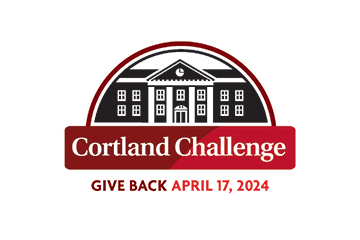 “Funds were raised through private donations in Mike’s memory,” said committee member Nan Pasquarello, director of Career Services. “Additionally, over the years proceeds from campus events including Body Appreciation Week “wear jeans” days and (pre-pandemic) Student Affairs Midnight Breakfasts generously kept the fund going.” The Michael C. Holland fund for nearly 10 years has assisted critical basic needs for student living expenses, including food, medical, transportation, temporary housing, utilities or clothing. Cutting through administrative delays, the committee often accepted student referrals by an associate dean or staff at the Conley Counseling and Wellness Services. Established in a partnership with the Interfaith Association and through the hard work of volunteers, the fund has fulfilled student emergency needs of up to $150 per student, for a total of $3,500 spent to date. “At the time the (Holland) fund was first created, the Cortland College Foundation did not have a fund or mechanism to quickly help students in emergencies, so the Michael C. Holland Fund served a really important purpose,” Pasquarello said. “It was only once the pandemic hit that foundations across SUNY were able to create emergency funds.” In spring 2020 during the start of the COVID-19 pandemic, generous alumni made donations to SUNY Cortland to assist students with emergency financial need, and the Cortland College Foundation then created a campus Student Emergency Fund that is now administered through Student Affairs. Like the Holland Fund, the Student Emergency Fund also focuses on unplanned financial emergencies and is not used to offset tuition, college fees, books, credit card debt or legal representation. By late 2020, Cortland’s foundation had raised $346,669 in gifts and institutional support and quickly distributed $230,638 of that funding to students in 701 grants of $500 per student per academic year. The fund continues to serve students in need. The Michael C. Holland Fund’s committee members decided last fall they would dissolve the fund held privately with the Interfaith Association and consolidate the money through a donation in early 2024 with the newer and larger fund administered by Student Affairs. The administration of the fund is by a campus employee rather than being run by volunteers, Pasquarello said. Moreover, the campus fund provides more financial assistance — up to $2,000 while a student is at Cortland — and has made a commitment to providing rapid responses to emergency requests. Additionally, this fund has the advantage of a steady donation revenue stream. “Now that this is established, it makes sense to have the Michael C. Holland Emergency Fund for Students be the ‘matching donor’ to grow the Cortland College Foundation’s campus fund,” Pasquarello said. “The committee decided to donate the full amount of the account to the Foundation’s Student Emergency Fund in memory of Mike Holland, thus dissolving the Michael C. Holland Emergency Fund, while keeping its spirit alive.” Current committee members, in addition to Pasquarello, include Susan Wilson, associate professor and chair of Recreation, Parks and Leisure Studies, Jerry O’Callaghan, associate professor of political science, and Billie Jean Goff, associate director of Counseling and Student Development emeritus. Cathy Smith, health educator emeritus, as well as former Interfaith Center chaplains Vicki Burtson, Rachel Mae-Rose and Laurel Harte- Westover, also served on the committee. Pasquarello noted that, as a testament to his lasting influence, the Student Government Association created a scholarship, the Michael C. Holland Memorial Scholarship. Also, an award for new professionals presented through SUNY Residence Life and Housing Administrators (SUNYRLHA) Award also bears his name. “The monies collected over the years through the Interfaith Association — held fund in Mike’s name — are being consolidated now that the foundation has a fund with even greater reach,” Pasquarello said. “We think we’ll be able to give a whole lot more money to students in need and can do it as fast.” The Student Emergency Fund is managed through Student Affairs’ Care and Outreach Services. For more information, visit the website or contact Emily Quinlan, assistant director of Care and Outreach Services. Learn more about how you can support the Student Emergency Fund, and have your gift matched in honor of Michael C. Holland, during the Cortland Challenge on April 17. SUNY Cortland recognized for election encouragementSUNY Cortland is one of only 93 institutions of higher education in the United States recognized this year for action plans promoting student participation in elections by one of the largest organizations in the U.S. promoting college students’ participation in the democratic process. For the second time, ALL IN Campus Democracy Challenge, a national, nonpartisan program promoting college voter registration and turnout efforts awarded SUNY Cortland a Highly Established Action Plan Seal. The university first won the honor in 2022. 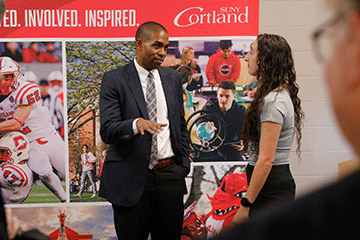 This year, the Challenge considered 932 action plan participants, each of which submitted a detailed outline of how it will reach its voter registration and turnout goals. Only two other SUNY institutions made the 2024 “highly established action plan” list. “The seal represents a lot of teamwork, a lot of coordination, a lot of input,” said John Suarez, director of the university’s Institute for Civic Engagement. “It really is an all-hands-on-deck effort to do three things: voter registration, getting out the vote and voter education.” Housed in SUNY Cortland’s Division of Academic Affairs, the Institute for Civic Engagement serves as a resource for students, faculty, staff and many community partners by promoting the development of mutually beneficial opportunities through applied, or experiential, learning. Cortland’s 28-page action plan includes voter registration, voter turnout and myriad voter education activities ranging from presentations to debates to deliberative dialogues. A recent one on April 3, titled “Free Speech and the Inclusive Campus,” included students from two student organizations, BridgeCortland and Turning Point USA, as well as faculty, staff and a Cortland County legislator. Such dialogues are important, according to Suarez, because they help participants practice discussing divisive issues in informed, civil and productive ways. “Voter registration is great, getting out the vote is great, but to have students motivated to get out to register to vote and then vote, to motivate students to participate in civic engagement between elections, we have to have students who know what’s going on,” Suarez said. 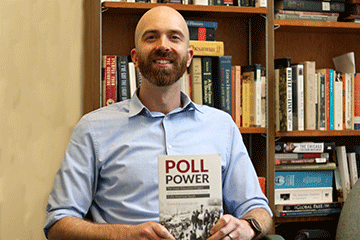 The ALL IN Challenge doesn’t support or oppose candidates for public office or take a stand for or against any political party. “More than anything else, students need to know how to listen with an open mind,” Suarez said. “It means critical thinking to test the accuracy and validity of what someone is saying, but especially to be a critical thinker and listener to someone who agrees with you, because your defenses are down.” The national Challenge was launched in 2012 when just 39% of young adults ages 18 to 29 and 47% of college students voted in the presidential election. The National Task Force on Civic Learning and Democratic Engagement had called on the U.S. to reclaim higher education’s civic mission. SUNY Cortland’s voting rate for eligible students was only 6.3% in 2014. The university joined the challenge in 2016. Afterward, Cortland raised its voter registration and voting rates to 77% and 24% in 2018 and 85% and 69% in 2020, respectively. Looking forward, student interns and volunteers registered 767 new voters in Fall 2022 and 777 new voters in Fall 2023, according to Marissa Pappas, project coordinator of the New York Public Interest Research Group at Cortland. Now, according to Suarez, SUNY Cortland is working to attain the highest voter registration and election turn-out rates possible by November 2024, 90% if possible. “We’ve seen a lot more students registering to vote using their SUNY Cortland address,” Pappas noted. “Also, there’s an uptick in them registering to vote by mail. We’re definitely getting students registered to vote a lot earlier. Pappas in four years has seen volunteer internships increase from about six students to more than 30 as NYPIRG tackles its nonpartisan issues of democracy, higher education, hunger and homelessness, environmental protection, public health and consumer protection. “It seems like more and more students are interested in getting away from the partisan thing and getting more down to the issues,” Pappas said. Building on the last action plan, the institute worked to convince faculty to design nonpartisan ways of incorporating discipline-based explorations of current issues as well as concepts regarding citizenship into course syllabi, Suarez noted. Faculty in the departments of Childhood/Early Childhood Education, English, Physics, and Recreation, Parks and Leisure Studies, Health, and Student Success (academic affairs) have undergone this very time consuming and intensive process, which the university rewarded with a stipend provided by Barbara A. Galpin ’68. Institutional Equity and Inclusion wholeheartedly joined the effort unprompted. “If I’m a physicist, I can use my skills to be able to research, to know where to find information, to access that information, to be able to turn that information into messages persons on the street can understand,” Suarez said as an example of the effort to infuse civic responsibility into diverse disciplines.  “President Bitterbaum and members of his leadership team have strongly supported the Cortland Votes effort, which works with community partners to establish a culture of voting on campus,” Suarez said. “In Fall 2023, Cortland Votes evolved into the Dragons for Democracy project, which works to help students understand that partnering with government is as important in addressing issues as partnering with not-for-profit agencies.” SUNY Cortland currently holds the prestigious community engagement elective classification from the Carnegie Foundation for the Advancement of Teaching through 2025 as both the first institution in the State University of New York system to capture this milestone in 2008 as well as the first one to hold the reclassification distinction. Executive-in-Residence spoke on economics of BroadwayMartin Borell ’74, who since 2014 has invested in and co-produced more than a dozen Broadway, Off-Broadway, London transfer and national musicals, plays and tours, shared his insight during an Executive-in-Residence at SUNY Cortland on April 5. Since 2014, Borell has had a hand in “Jagged Little Pill,” “Fiddler on the Roof in Yiddish” “Bonnie and Clyde,” “The Gershwins’ Porgy and Bess,” “An American In Paris (Broadway, London, national tour),” “Anastasia (Broadway and national tour),” “Curvy Widow (Off-Broadway),” “American Son,” “Percy Jackson (national tour)” and the upcoming “Jagged Little Pill” tour as well as several more productions in development. During the visit Borell, who divides his time between his home in Tampa, Florida, and New York City, engaged with both students and faculty in the Performing Arts Department. During the afternoon, he lectured on “The Economics of Broadway” in the Voice Lab: Repertory class with voice trainer Lynn Craver, lecturer II, and department Chair Deena Conley. Borell also took a backstage tour of the “Sweet Charity” musical set, where he had an informal chat with the student cast members. Following an afternoon tour of the campus that is much changed since he graduated, he attended that evening’s “Sweet Charity” performance. 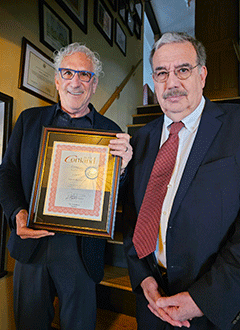
“We are very excited to have Mr. Borell visit with our musical theatre majors,” Conley said. “Mr. Borell’s impressive and extensive experience in the theater industry will certainly assist our students in not only learning about theater as a craft, but also, and just as importantly, theater as a business.” At SUNY Cortland, Borell earned a B.A. in English education, English and secondary education. In 1982, he received a Master of Education in adult learning and organizational development from University of Maryland. Borell has almost 25 years of experience providing consulting services to Fortune 500 companies and large public organizations, culminating in several managing partner positions with Accenture Ltd., the world’s largest technology and management consulting firm based in Dublin, Ireland. His expertise includes large-scale change planning and implementation, human and organizational performance improvement and leadership development and executive coaching. He retired from Accenture in 2002. Since retirement, Borell has also been active in the not-for-profit world. A past board chair of the Florida Holocaust Museum, during his five years serving the museum he led the implementation of a best practices governance structure, a strategic planning process and the selection and on-boarding of a new executive director. To honor Borell, the museum established the Martin H. Borell Scholarship Fund to underwrite admission fees to the museum for school classes that might not otherwise be financially able to attend. Borell currently sits on the boards of several nonprofits focusing on mental health and the performing arts. He helped other local nonprofit boards, such as the Florida Orchestra and the Florida Craftsman, with strategic planning and implementation. The Executive-in-Residence program is supported by the Cortland College Foundation, Alumni Engagement and Career Services. For more information, contact Leadership Gift Officer Michele Artus at 607-753-4998. Dowd Gallery presents Student Select 2024Student Select 2024, an annual, juried exhibition featuring artwork created by 50 SUNY Cortland art students, opened on Monday and runs through Friday, May 3, in the Dowd Fine Arts Center’s Dowd Gallery. Carla Stetson, a contemporary artist and educator in the Ithaca, N.Y., region, was invited to be this year’s juror by the student-run Art Exhibition Association, which organized and sponsored the exhibition. “I selected pieces that I believe will make a strong student exhibition showcasing works from all media areas,” Stetson said. Student Select 2024 will feature an opening reception and awards ceremony from 5 to 7 p.m. on Wednesday, April 17, in the Dowd Gallery. The ceremony will feature the student artists, faculty and staff from the Art and Art History Department and Stetson. Winners will be announced for best in show, second prize, third prize and honorable mentions. Also during the ceremony, the winner of the fourth Muriel and Newell Keegan Prize for Excellence in Studio Art will be announced, and Dana Garrison, a graduating BFA studio art major with a concentration in painting, will deliver her BFA thesis defense on her body of work, “In the Weeds.” The exhibition and opening reception are free and open to the public. Stetson, whose work was displayed in the Dowd Gallery's recent “Eye Witness” exhibition, made her final selection of work on April 9. She chose for the exhibition 76 pieces made by 50 student artists out of 97 submissions. Their names are listed at the end of the article. “This year’s exhibition explores the depths of the Art and Art History Department’s studio course diversity with a range of work from foundational courses through specializations,” Stetson said. “Visitors will experience a varied display of drawing, sculpture, ceramics, digital, print media, fibers, painting and more. “Besides the first, second and third place winners, I selected three worthy honorable mentions. These award-winning works stood out for many reasons, most importantly a brave and innovative use of materials combined with an original, often very personal, conceptual basis. They were poignant, sometimes humorous and each winning entry demonstrated exceptional technical skill.” Garrison’s BFA exhibition “In the Weeds” is on display in the west wing of the Dowd Gallery. Scott Oldfield, gallery interim director, described “In the Weeds” as a journey through the artist’s relationship with herself and the individuals surrounding her. 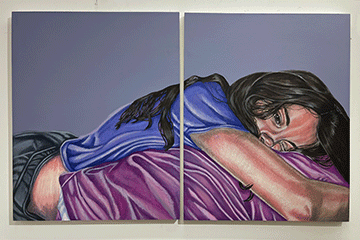 “Each piece provides a window into the intricate tapestry of emotions, experiences and connections that have shaped her existence,” Oldfield noted. “Through a dynamic use of color, form and symbolism, the artist delves into the complexities of human interaction, exploring themes of love, loss and resilience,” Oldfield said. "In our lives, we can find comfort in comparison," Garrison said of her mainly mixed media work, which allows her to create layers that push and pull each other, symbolizing fluctuations in the human condition. "A bad day can be compared to a bump in the road which wears itself out over time. A first touch with someone we come to love can be fireworks. Comparison helps us make sense of feelings that may be hard for us to experience: a juxtaposition of our emotions and experience to the known and accepted. Growing up surrounded by nature, from my grandfather’s garden to the dense forest behind my childhood home, I use symbols of nature as proxies for my personal experiences and emotions." During finals week, the gallery will remain open with a pared-down exhibition as students remove their work and faculty picks are relocated for display at Memorial Library. The gallery in Dowd Center is located on the corner of Graham Avenue and Prospect Terrace. The Dowd Gallery is open from 10 a.m. to 5:30 p.m. Mondays, Tuesdays, Wednesdays and Fridays; and 10 a.m. to 7 p.m. on Thursdays. Walk-ins are welcome. The exhibition is closed on Saturdays. For more information, an appointment, a tour, or additional images, contact Oldfield at 607-753-4216. Visit the SUNY Cortland Dowd Gallery website for details about exhibiting artists, other programs, safety protocols and group visits. Participants in this year’s Student Select include: Jade VanZile Angie Tillapaugh Madison Hanford Allison Perna Danielle Lewis Gabz Danyew Megan Ludgate Devon Blackwood Meghan Wardell Lee Clasby Zoe Vaughn Dina Palaguachi Abigail Benham Virginia Alvisi Kathleen McDonough Brooke Missina Aimee Craddock Lisa Smith Terrell Parks Ashley Nazario Morgan Cherrone Jordan Hildalgo Rameen Zehra Dana Garrison Chloe Loewenguth Cameron Eastwood Sarah Goldberg Kat McCormick Ella Gorrell Marjorie Castilla Sophie Marin Jean Tomassini Shelby Swift Henna Luke Keightlen Eaton Ashley Hoyte Bob Ponterio Miles McCabe Brooke O’leary Ray Beltran Marissa Deluca Firat Ercan Terrel Parks Christopher Ramirez Ariele Vance Nick Kaires William Henry Hilburger X’Avion Irons Haley Lambert Yves Auguste Transfer students inducted into honor societyForty-five SUNY Cortland transfer students were inducted into Tau Sigma National Honor Society on Monday, April 1. Tau Sigma, including its SUNY Cortland Pi chapter, is an academic honor society designed specifically to recognize and promote the academic excellence and involvement of transfer students. Recognizing academic achievements, students must transfer to an institution of higher learning from another academic institution with at least one full year’s academic credits satisfied at the prior institution(s) and must earn at least a grade point average of 3.5 or better after earning at least 12 credits at Cortland. More than 90 students, families, faculty and staff attended the ceremony in the Corey Union Function Room, hosted by the Advisement and Transition Office. President Erik J. Bitterbaum provided a welcome and Ryan Vooris, chair of the sport management department and transfer student himself, presented the keynote address. Students learned more about the roots of Tau Sigma, recited the Tau Sigma pledge and were formally inducted after receiving their certificate and Tau Sigma pin. Inductees had an opportunity to recognize a faculty or staff member who has influenced them at SUNY Cortland. This year was the 20th year for the Pi chapter at SUNY Cortland, which has inducted over 1,000 students since 2004. Students who have been elected to membership are: Sophie Alemany David Alexander Rachel Bouwens Sierra Brown Sara Case-Kneeland Aimee Craddock Caroline Dineen Kaitlin Dodge Samuel Doyle Adam Evans Timothy Feeney Colby Fendick Chase Fusaro Emma Gillis Nicholas Gokey Denneille Graham Jacey Hatfield Ryan Hayes Mariah Hogg Jacob Ianno Rachel Katz Sarah Kiefer Nadiia Kostiuk Paige Lane Anjuli Latchmansingh Sasha Machmuller Isabella Macniven Samantha Malbouf Alexandra Martinez Elizabeth Martuscello Brianna McBride Megan McConologue Matthew Michaud Kaylee Niznik Alexandre Rodrigues Allie Schwerthoffer Victoria Sorace Gianna Trunfio Jared Trupp Skyler Turpin Matthew Villanueva Ryan Walsh Sophia Waters Mackenzie Weaver Sydney Yates  Suggest a feature story Suggest a feature story
Faculty/Staff ActivitiesJoseph AnthonyJoseph Anthony, Political Science Department, co-edited Lessons Learned from the 2020 U.S. Presidential Election: Hindsight is 2020, recently published by Palgrave Macmillan Press. Scholars in the book contributed their research on how the COVID-19 pandemic impacted the administration of the 2020 elections. Teagan BradwayTeagan Bradway, English Department, gave the keynote lecture for the annual Shifting Tides, Anxious Borders Graduate Conference hosted by the Department of English, General Literature, and Rhetoric at Binghamton University. Bradway’s lecture, presented on March 23, was titled “Feeling the Fantasy: The Politics of Pleasure in Queer and Trans Camp." Terrence D. FitzgeraldTerrence D. Fitzgerald, Biological Sciences Department, is the author of a research paper titled “Colonies of the Eastern Tent Caterpillar Malacosoma americanum (Lepidoptera: Lasiocampidae) Abandon Trails to Depleted Feeding Sites and Follow the Most Direct and Shortest Pathways Between their Tent and Food-Finds” appearing in the current issue of the Journal of Insect Behavior. Caroline KaltefleiterCaroline Kaltefleiter, Communication and Media Studies Department, presented a paper titled “Water-Tok Girls: The Politics of the Stanley Cup Craze, Capitalism, and Girls’ Consumption Practices in Everyday Day Life” at the Girlhood Studies Collective Conference held April 5 at Rutgers University, Camden, N.J. It was a virtual presentation. Her research paper, “Sista Grrrls Riot: Phantom Power, Liminality, and (Trans)Locution to Resist Racism and Fascism” was presented at the Reimagining Anarchism: Race, Class, Gender and Revolution Symposium held March 23 at Cornell University. Nancy KaneNancy Kane, Kinesiology Department, returned to southern Seneca county, N.Y., to introduce Irish Step Dance to 7 to 10-year-olds at the public library in Ovid, N.Y. The class was sponsored by a grant from New York State Office of Children and Family Services whose purpose is to provide a variety of physical education opportunities including dance, yoga and sports to youth in under-resourced communities. Seneca Towns Engaging People for Solutions (STEPS) was the recipient of the grant. STEPS is a health-promotion project of Pivital Public Health Partnership, funded by the Greater Rochester Health Foundation.  Submit your faculty/staff activity Submit your faculty/staff activity
|
The Bulletin is produced by the Communications Office at SUNY Cortland and is published every other Tuesday during the academic year. Read more about The Bulletin. To submit items, email your information to [email protected]
© 2026 SUNY Cortland. all rights reserved.